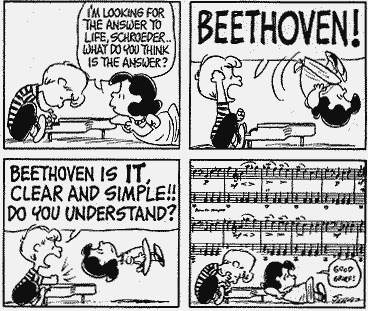right. let's see how far or near my ramblings take me.
I had the entire Beethoven/Karajan, Deutsche Grammophon series on vinyl record, full weight.
My house was a royalist house and by god we would have only the best of the best according to 1865 standards.
I grew bored, or more, disillusioned with classical music in general.
1. yes, most of the composers we know are geniuses, of varying levels of genius. Mozart, Bach, these guys were on another level, never mind the year they were working in. Many composers one step below the great classics are also due for deference and they have a great body of really .. skilled stuff.
But most of it is incredibly boring; and not just the minor works by the great artists, but the very great works themselves. I am as happy as you are to listen to the aria of the queen of the night .. oh god i remember writing this very phrase her already years ago ..
I am as happy as you are to listen to the aria of the queen of the nigh from Die Zauberflote, or Papageno & Papagena's arias, but i do not care for the very long many minutes of music in between. THIS is the most important aspect of the change between traditional music and modern music.
2. there are a number of relatively obscure composers whose works are of exceptional musical value, and yet they are near impossible to enjoy. I'm thinking Pierrot Lunaire:
but also much of the situational music by post-romantic composers. Maybe they are not as outrageous as Schoenberg, but nevertheless there are many sections of their works where the audience just "waits" for the good stuff to come on. Verdi was both loved and ridiculed for writing easy-tunes that the common man would love; here is his most beloved,
Gloria All'Egitto (marcia trionfale) have a listen, it's great, isn't it? Ok now go back to the start and try to hum the tune that leads to the march.
You can't sell me a 2 1/2 hour opera on the grounds of four or five 3-minute pieces of music, sometimes less.
Modern music completely did away with having to tie two pieces of music, you get a song, it starts, it's immediately good, and then it ends. Then you do it again. It is vastly better a s a consumer product. And, i don't mean that in an insulting way, or dememaning, it's just that a product whose sole purpose is enjoyment, will be judged by how enjoyable it is.
Jazz is the place where you wind up if you like to visualize your music, and even that can be hit or miss. Some of it is amazing, but the more technical stuff tends to forget that there are humans listening to it. Look guys i'ma level with you, me and a friends both out of Berklee went to see Wayne Shorter on one of his last concerts, and WE who were just out of jazz college could understand maybe 30% of what was going on. Looking around at all the ladies in gowns, i suspect the most of the audience was there for the social occasion rather than the music (EUR 110/ticket back in 2003?).
I believe that there is still a place for classical music, but if one wants to reach it, they need to understand the demands of their audience.
(i am intentionally leaving out some more complex factors that i really dont care to waste the whole day explaining)




